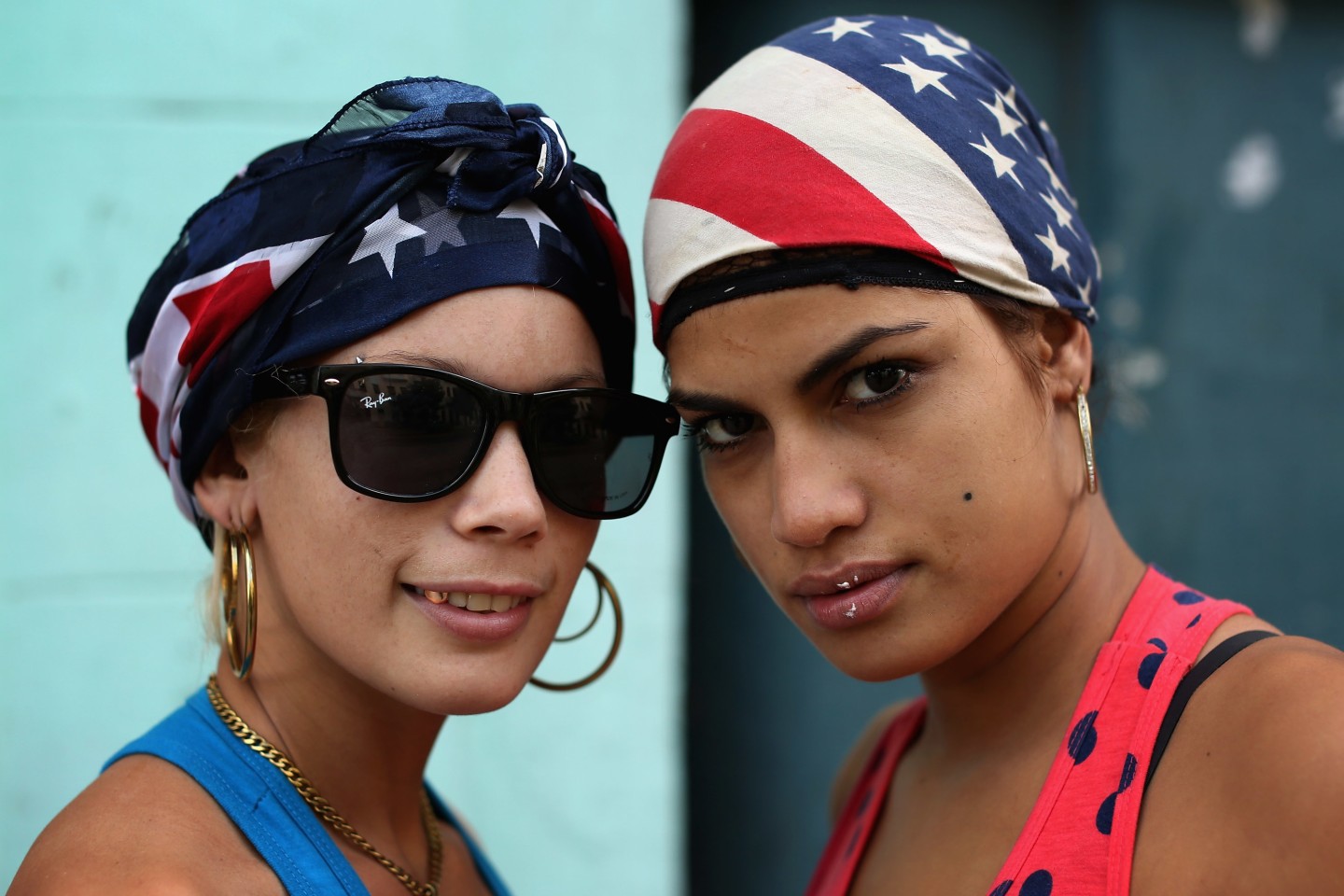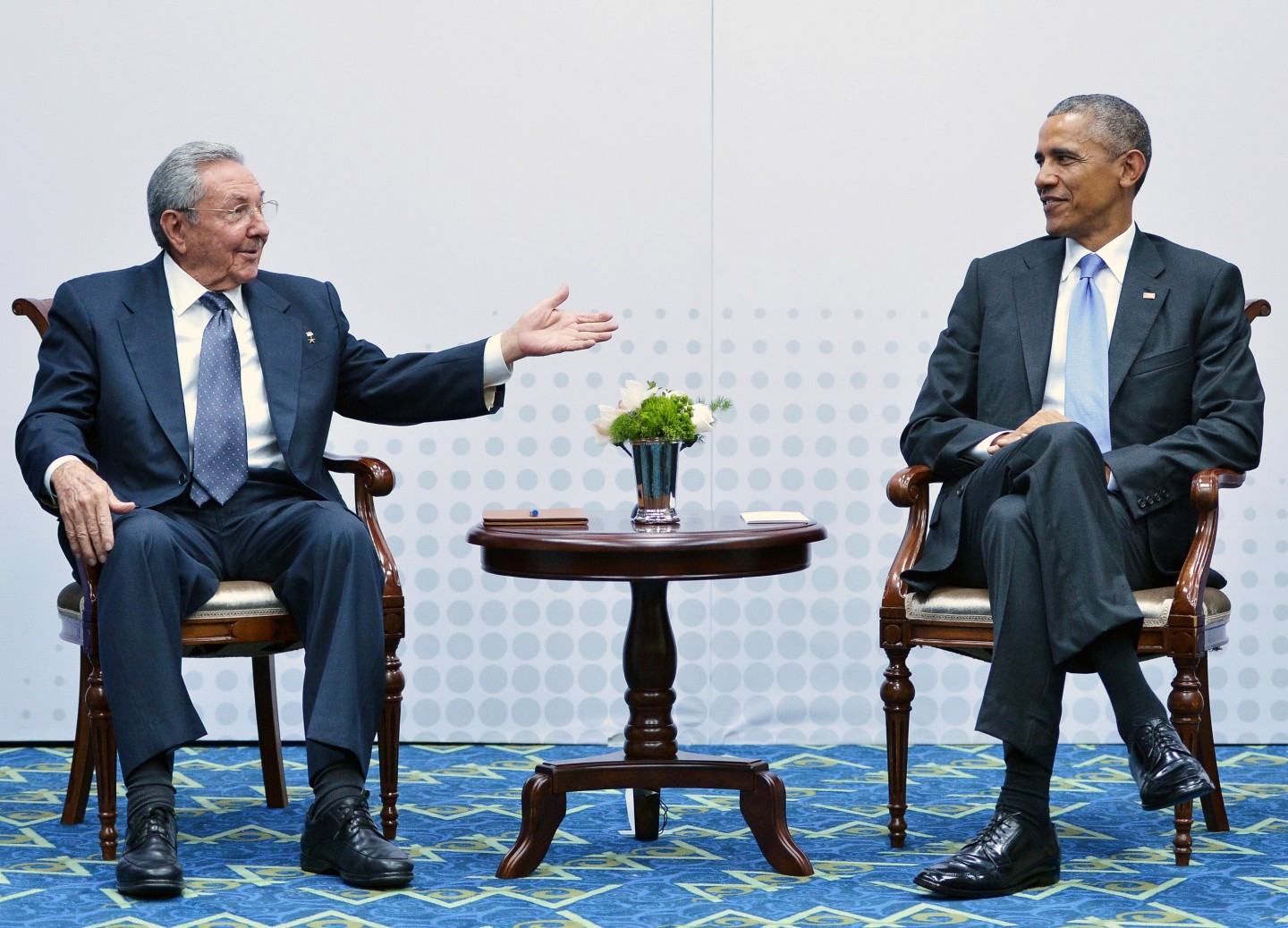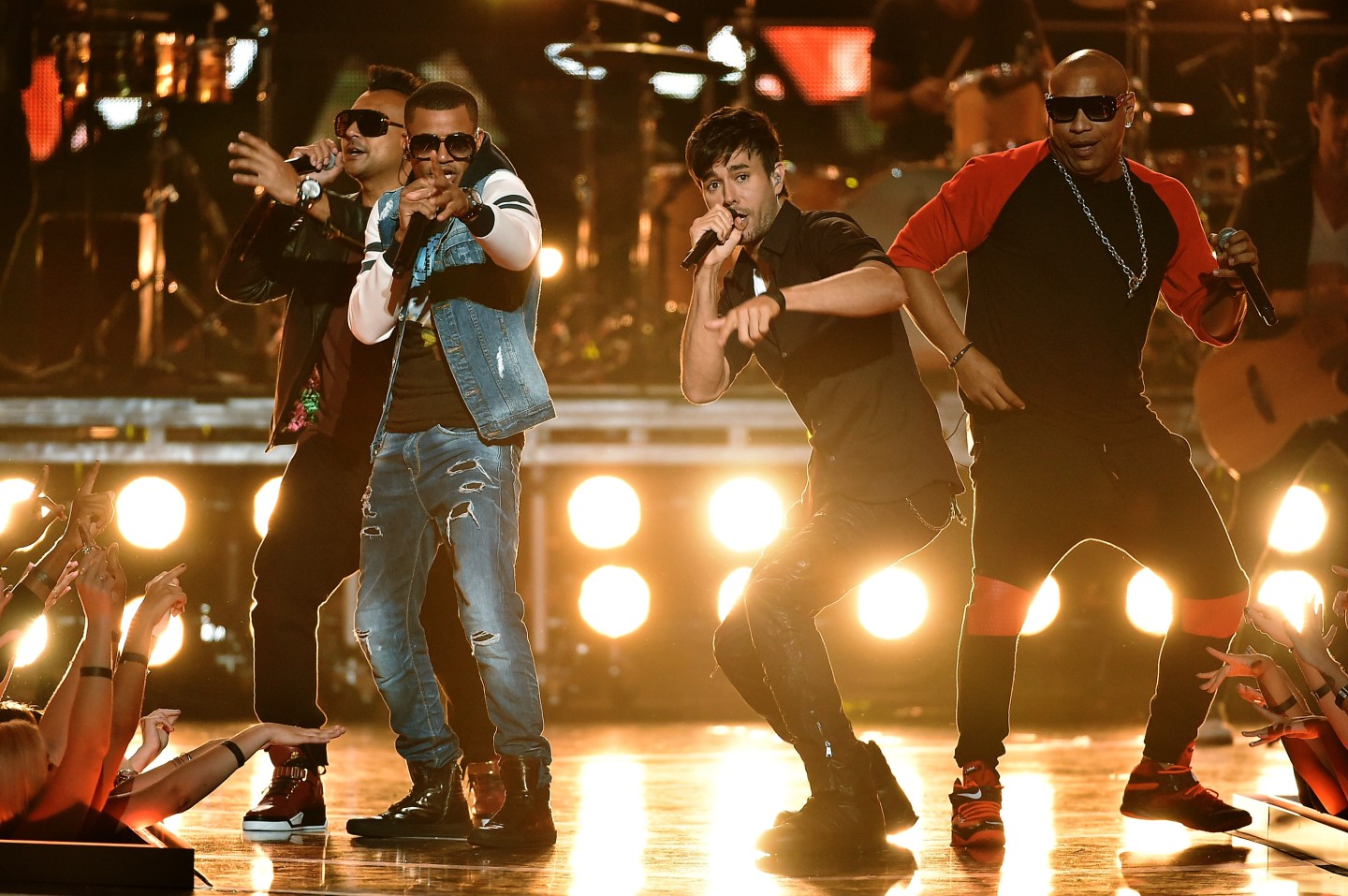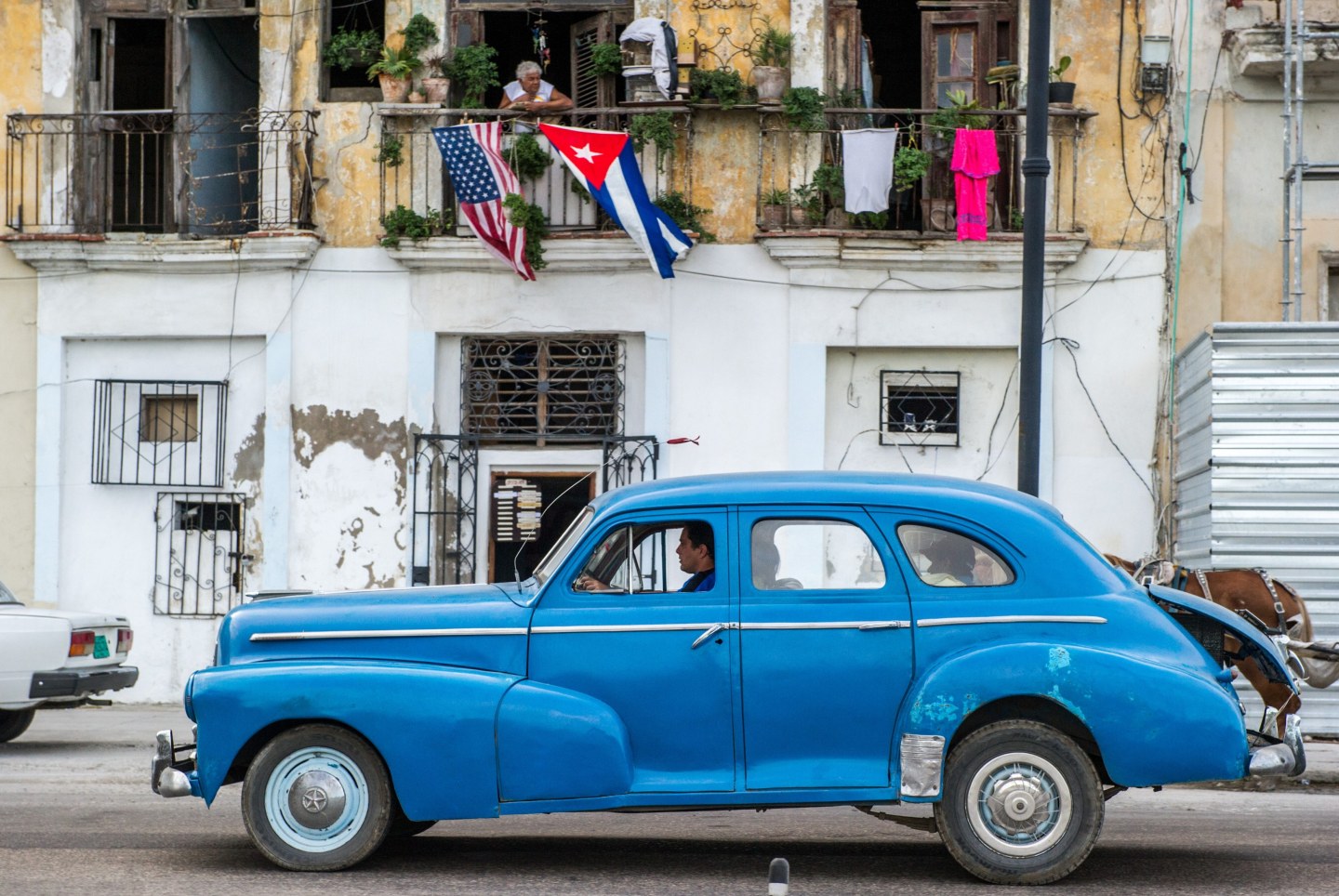Is Cuban Music About To Blow Up In America?
As the U.S. and Cuba re-establish diplomatic relations, Latin music execs are scouting the island for crossover hits.
 Two girls wearing the American flag in Havana in January 2015, following the announcement that diplomatic ties were to be re-established between the US and Cuba.
Chip Somodevilla / Getty Images
Two girls wearing the American flag in Havana in January 2015, following the announcement that diplomatic ties were to be re-established between the US and Cuba.
Chip Somodevilla / Getty Images
Musically, Cuba is like a paellera—the pan in which locals cook up their take on the Spanish paella—filled with flamenco licks, Jamaican dancehall riddims, West African drum beats, and club-ready blends like cubaton and reggaeton. It's a broad sonic spectrum that was borne painfully from Cuba's blood-stained legacy of Spanish colonizers and imported African slaves, with Afro-Cuban percussion providing the backbone to many of the country's diverse musical styles. Cuba is often seen as the ultimate music mecca, however, thanks to fraught Cuban-American relations, there’s been little chance of experiencing it in person for over fifty years.
It was a different story in the early ‘50s, when Cuba's capital Havana was a playground for America’s rich and hedonistic: hop aboard a short flight, hit up venues like the Tropicana Club in the city’s Marianao neighborhood, famed for popularizing the mambo and the rumba, and be in with a chance of rubbing shoulders with Hollywood A-listers like Marlon Brando and Ava Gardner. However, diplomatic relations were put on ice back in January 1961––following divisive revolutionary Fidel Castro’s 1959 takeover of the U.S.-backed Batista government and the country’s subsequent shift towards communism––and a trade embargo was imposed that same year. The good times ground to a halt.
 Cuba's President Raul Castro speaks with U.S. President Barack Obama in Panama City, April 2015.
Mandel Ngan / Getty Images
Cuba's President Raul Castro speaks with U.S. President Barack Obama in Panama City, April 2015.
Mandel Ngan / Getty Images
On July 1st 2015, a historic deal saw Cuba and America formally restore diplomatic relations.
That was until July 1st 2015, when a historic deal between U.S. President Barack Obama and Cuban president Raul Castro saw the two countries formally restore diplomatic relations. (Last Monday saw the reopening of Havana’s embassy in Washington.) The tide was already turning last December: a statement issued by The White House had unveiled Obama’s intentions to unpick the fraying stitches of Cold War history, “normalizing relations” between the two countries in the hope of providing “more opportunities for the American and Cuban people.”
Since then, Obama has already begun lifting travel blockades. Any American wishing to travel within one of 12 approved categories or purposes––including participation in public performances, visits to close relatives, and professional research––is no longer required to apply for a case-by-case license from the OFAC, which had previously been a lengthy and convoluted process. Now you just have to tick a box and keep your receipts for five years. Although tourist travel is still currently prohibited by statute, people-to-people programs (which fall within the remit of education as far as the 12 categories of general-license travel are concerned) could offer a way around the holiday ban as they do not discriminate on eligibility. However, they come with a strict itinerary and will set you back thousands of dollars as the trip must be booked through a certified organization like Blue Note Travel.
Cuban nationals, on the other hand, have been able to visit the U.S. freely since the island eased travel restrictions two years ago, but how will they fare from this renewed relationship? For starters, despite the trade embargo still being in place, Obama and Castro have eased import restrictions from the U.S., allowing more American telecommunications and technological goods into Cuba. This should help make the country better connected; according to independent watchdog organization Freedom House, only between 5%-26% of the 11.3 million people currently living in Cuba have access to the internet, with hourly connection costs amounting to as much as 20% of monthly wages.
“There’s just so much enthusiasm for anything Cuban at the moment.”—Michel Vega
So what does all this mean for the Cuban music industry? According to Latin music executive Michel Vega—the former head of Latin music at William Morris Endeavor, the first major talent agency to have a department dedicated to the Latin market, and now the CEO of songwriter/producer Marc Anthony’s new entertainment company, Magnus Media LLC—many of his colleagues in the U.S. music industry have been treating the new relationship a little like a gold rush. “We’ve heard of a lot of A&Rs and writers going over to Cuba and doing scouting trips,” he tells me over the phone from his home in Miami. “It just seems that every day you hear about someone having gone or planning to go. With a rise in Americans traveling to Cuba, the ball is now rolling and there’s just so much enthusiasm for anything Cuban at the moment.”
Vega says that, historically, U.S. record labels have been unwilling to sign Cuban artists, largely on account of the politics and the complexity of traveling between the two countries. Since 1988, the congressional Berman Amendment has exempted “informational materials” like records from the trade embargo––meaning Americans could legally license recordings by Cuban artists that had already been produced––but performing in the U.S. has been a different story. The majority of Cuban artists have to hire a lawyer to organize their artist visa, which is an expensive and arduous process that can sometimes take up to four months. What’s more, if they do get their travel authorized, performers are not entitled to any kind of fee, only small “per diem” payments which amount to a maximum of $188 a day, per group. However, this could change in time if the trade embargo is lifted by congress.
“All the A&Rs have started rushing here and I think that the labels are very interested in capitalizing on what’s going on.”—Javier Otero
Havana-born Javier Otero, the founder of music production company Blue Night Entertainment, says that he has also noticed an increased flurry of industry activity directed at Cuba. “All the A&Rs have already started rushing here and I think that the labels are very interested in capitalizing on what’s going on, although I think they’re still a little bit cautious about the legal aspects,” he explains. “But it’s like anything––what will happen eventually is that Cubans will end up being viewed just like people from anywhere else in the world, in as far as the musicians are concerned anyway.”
Otero is looking ahead to the day when Cuban music will be widely embraced by the U.S. commercial mainstream. Although there are a few obstacles to overcome before the path is cleared completely, a number of Cuban artists have already broken through. Take popular reggaeton act Gente de Zona, for example, just one of the acts that Blue Night represent. The Cuban duo mix the rap/reggae hybrid with more traditional rhythms like son––a melding of classical Spanish compositions with Afro-Cuban percussion––and have triumphed in the current climate. They won three Latin Grammys for their collaboration on Enrique Iglesias’ 2014 hit “Bailando,” which topped the Latin Charts for 33 weeks. Then, just last month, a recording of their track "Homenaje Al Beny (Castellano Que Bueno Baila Usted)" was played at a conference celebrating Apple’s new streaming service, chosen by Eddy Cue, Senior Vice President of Internet Software and Services and an American of Cuban descent.
 Gente de Zona performing with Enrique Iglesias and Sean Paul in New York, 2014.
Theo Wargo / Getty Images
Gente de Zona performing with Enrique Iglesias and Sean Paul in New York, 2014.
Theo Wargo / Getty Images
“Gente de Zona didn’t have this kind of ideological weight on them as much as the previous generation. I think that could be a precedent for future Cuban musicians.”—Billboard’s Judy Cantor-Navas
Billboard’s Latin music specialist Judy Cantor-Navas has nothing but respect for Gente de Zona for opening more ears to what Cuba has to offer. “They have learned to use all the skills they have but to do a sound that’s more international and has all the things that everyone loves about Cuban music,” she says, over a Skype call from Barcelona. “What’s more, Gente de Zona didn’t have this kind of ideological weight on them as much as the previous generation to say they couldn’t do it and I think that idea could be a precedent for future Cuban musicians.”
Otero says that Cubans are excited about what the future might bring. “The relationship between Cuba and the U.S. has been broken politically for years, but the U.S. has not abandoned Cuba and has helped support it by providing food and aid during times of need.” he says. “A lot of Cubans see America as a great country. I believe that large record companies, like Sony, will now want to establish offices in Cuba because Cuba is one of the most culturally rich countries in the world and Cuban music is known everywhere.”
Cuban hip-hop, in particular, has been flourishing since the early 1990s, when the government announced the implementation of periodico especial, or the “Special Period.” This was a time of austerity which coincided with the collapse of the Soviet Union, Cuba’s long-term communist ally to whom it had always turned to for economic and political support, as well as trade. The economic depression saw many raperos, or rappers, turn to music as a vehicle for their discontent. Despite the political divide of the time, the influence of U.S. rap in Cuba was very present, even though it wasn't always the easiest to come by.
“I believe that large record companies, like Sony, will now want to establish offices here because Cuba is one of the most culturally rich countries in the world.”—Javier Otero
“It’s a myth that Cubans never listen to American music,” says Cantor-Navas. She has been going back and forth to Cuba since the ‘90s. “Whether it was a case of people bringing records in when they went abroad back in the ‘70s and ‘80s, or via pirate satellite dishes. They used to—or still do—make homemade antennae so they can listen to American radio stations from Miami, and that’s how so many things got in. Then there was a point in the ‘90s that the hotels started to get MTV. I think many Cuban artists see the States as somewhere they should be.”
Unlike in the U.S., the Cuban music industry is regulated by the government, with the majority of artists on a salary. If the Cuban-American trade embargo is lifted, EGREM—the country’s state-run record label since 1964—may find itself licensing more and more of its recording artists and songwriters to U.S. labels and, as Otero suggested, seeing those same major labels establish offices in its capital. The FADER reached out to EGREM and fellow Cuban label Bis Music for comment.
I asked Cuban sound engineer Ali Álvarez, the son of famous pianist and composer Adalberto Álvarez, whether he sees the thawing out as a chance for Cuban recording artists to make a bigger splash in the U.S. charts. He says he’s unsure how easily they will fit in: “I think it will be a while before we see any massive surge, not necessarily because of politics but more because of mentality. Most Cuban artists and producers do not fully understand the American market per se. Their lyrics are extremely local and the level of production is poor in most cases, due to the lack of technological knowledge and expertise.”
 An old American car in the streets of Havana, Cuba, as the two country's flags hang above.
Yamil Lage / Getty Images
An old American car in the streets of Havana, Cuba, as the two country's flags hang above.
Yamil Lage / Getty Images
“Cuba is like a rough diamond, but hopefully this change will be an eye opener for those on the island and they will start to produce works that compete with what’s coming from the U.S.”—Ali Álvarez
In more traditional circles, Cuba's commitment to the arts is demonstrated by its prestigious conservatories, like the Amadeo Roldán, and its classically trained musicians like Roberto Urbay; some of the best in the world. “Cuba is like a rough diamond," Álvarez continues, "but hopefully this change will be a big eye opener for those living on the island and they will start to catch up, producing works that are up to compete with what's coming from the U.S. and other parts of the world.” Where there’s youth, there’s curiosity, and it’s arguably a synthesis of the old and the new that creates the most exciting, forward-thinking music—and Cuba's richly diverse musical heritage means there's plenty for a younger generation of musicians to draw on.
Now diplomacy has been restored, it’s possible that sonic adventurers will find more opportunities to present their music to a U.S. audience. And if Cuba’s communication infrastructure improves, then the internet will, of course, be an all-important vehicle for casting the island nation's myriad musical styles further afield.